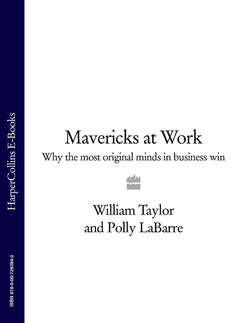Читать книгу Mavericks at Work: Why the most original minds in business win - William Taylor - Страница 6
NOTES - INTRODUCTION
THE MAVERICK PROMISE
Оглавление1. Alan Kay uttered his immortal words at an early meeting of the Xerox Palo Alto Research Center (PARC). He spent the 1970s at this hothouse of innovation. The full quote is even more instructive: “Don’t worry about what anybody else is going to do…. The best way to predict the future is to invent it. Really smart people with reasonable funding can do just about anything that doesn’t violate too many of Newton’s Laws.” For more on Alan Kay, see his organization’s Web site (www.viewpointsresearch.org).
2. Pete Carril’s career record at Princeton was 514–261. His teams won 13 Ivy League crowns and held their own against many powerhouse programs. See The Smart Take from the Strong: The Basketball Philosophy of Pete Carril by Pete Carril with Dan White (University of Nebraska Press, 2004).
3. There’s more than a little mythology surrounding the origins of the word “maverick.” In The New Language of Politics (Random House, 1968), word maven William Safire repeats a colorful (but wholly inaccurate) story about Samuel Augustus Maverick: “Old man Maverick, Texas cattleman of the 1840s, refused to brand his cattle because it was cruelty to animals. His neighbors said he was a hypocrite, liar, and thief, because Maverick’s policy allowed him to claim all unbranded cattle on the range. Lawsuits were followed by bloody battles, and brought a new word to our language.”
In fact, Samuel Augustus Maverick (1803–70) was a graduate of Yale, a signer of the Texas Declaration of Independence, and a fabulously successful land speculator who cared little about cattle. (Maverick County in southwest Texas is named in his honor.) When someone repaid a debt with 400 head of cattle rather than cash, Maverick’s caretakers allowed them to wander unbranded. Over time, locals who saw unbranded cattle would say, “Those are Maverick’s”—and a term was born that today refers to politicians, entrepreneurs, and innovators who refuse to run with the herd. (Not to mention Tom Cruise’s fighter-pilot character in Top Gun.)
In a neat twist of fate, several of Samuel Maverick’s descendants became legendary political figures in Texas with an undeniable, well, maverick streak. His grandson, Maury Maverick Sr., was a pro-FDR congressman during the New Deal and one of San Antonio’s most controversial mayors. (Maury Maverick Sr. famously coined another term—“gobbledygook”—to describe his interactions with New Deal agencies.) Samuel Maverick’s great-grandson, Maury Maverick Jr., was a crusading lawyer, legislator, and newspaper columnist who championed free speech and civil rights. In many respects, the Maverick tradition is to San Antonio politics what the Kennedy tradition is to Boston politics—colorful, influential, and impossible to ignore.
For accurate information on the Maverick family and the term itself, see these sources: Turn Your Eyes Toward Texas: Pioneers Sam and Mary Maverick by Paula Mitchell Marks (Texas A&M University Press, 1989); “Mavericks Are Texas-Grown” by Leon Hale, Houston Chronicle, January 23, 2004; “The Last Maverick” by Jan Jarboe Russell, Texas Monthly (July 2003). Another go-to source is The Handbook of Texas Online (www.tsha.utexas.edu/handbook/online), which has entries on multiple generations of the Maverick family as well as on the terms “mavericks” and “mavericking.”
